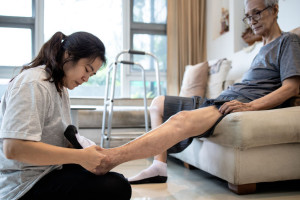How to Ask for Help and Get Respite as a Caregiver
 Caregiving is an act of love, compassion, and selflessness, but it’s also physically, emotionally, and mentally exhausting. Whether you’re caring for an aging parent, a partner with a chronic illness, or a child with special needs, the responsibilities can quickly become overwhelming. Many caregivers feel guilty for asking for help, thinking they must “do it all,” but the truth is: you can’t pour from an empty cup. Taking care of yourself is not selfish, it’s essential.
Caregiving is an act of love, compassion, and selflessness, but it’s also physically, emotionally, and mentally exhausting. Whether you’re caring for an aging parent, a partner with a chronic illness, or a child with special needs, the responsibilities can quickly become overwhelming. Many caregivers feel guilty for asking for help, thinking they must “do it all,” but the truth is: you can’t pour from an empty cup. Taking care of yourself is not selfish, it’s essential.
Here’s how you can ask for help, get some much-needed respite, and protect yourself from burnout.
1. Recognize That You Need Help
The first and most important step is acknowledging that you can’t do this alone. If you’re constantly tired, irritable, or feeling resentful, these are signs of caregiver burnout. It’s okay to admit that you need help. You’re human.
Asking for support isn’t a sign of weakness, it’s a sign of strength and self-awareness. The sooner you recognize your limits, the better you’ll be able to manage the caregiving journey in a sustainable way.
2. Be Direct and Specific with Family and Friends
Oftentimes, friends and family want to help, they just don’t know how. Instead of saying, “I’m overwhelmed,” or “I need help,” be specific with your requests:
“Could you sit with Mom on Tuesday morning while I go to an appointment?”
“Would you mind bringing over dinner one night this week?”
“Can you help with the grocery run this weekend?”
People are more likely to respond positively when they understand exactly what’s needed. Create a list of recurring tasks and share it with family and friends so they can choose what they’re comfortable doing.
If someone offers help, don’t brush it off, say yes.
3. Tap Into Local and State Support Programs
Many caregivers are unaware of the resources available in their own communities. Depending on where you live, you may be eligible for:
Respite care programs (short-term relief through in-home care or adult day centers)
Home health services
Financial assistance for caregivers
Transportation services for medical appointments
Caregiver support groups and mental health counseling
Start by contacting your local Area Agency on Aging or equivalent organization. They can connect you with programs like Medicaid waivers, veterans’ benefits, and state-funded respite care.
You can also check national resources like:
Eldercare Locator
Family Caregiver Alliance
ARCH National Respite Network
These organizations provide valuable information on how to get practical and financial help.
4. Consider Hiring Help (If Possible)
If your budget allows, hiring professional caregivers—even for a few hours a week—can make a big difference. Options include:
Home health aides
Personal care assistants
Housekeepers or meal prep services
These services can give you a break while ensuring your loved one receives quality care. If cost is a barrier, explore sliding-scale services or volunteer respite programs offered by churches or nonprofits in your area.
5. Join a Caregiver Support Group
You are not alone, even if it sometimes feels that way. Support groups offer a safe space to share frustrations, learn from others, and get emotional validation from people who truly understand what you’re going through.
Look for local in-person groups or virtual communities on platforms like Facebook or through organizations like AARP or the Alzheimer’s Association.
6. Prioritize Your Own Well-Being
It’s not just okay, it’s necessary, to take time for yourself. Even 10-15 minutes a day to stretch, journal, meditate, walk outside, or just breathe can help you recharge.
Schedule regular time for:
Physical activity
Adequate sleep
Medical checkups
Enjoyable hobbies
If you find yourself neglecting your own health or feeling persistently depressed or anxious, reach out to a therapist or counselor. You matter just as much as the person you’re caring for.
Final Thoughts: Caring for Yourself Is Caring for Them
Being a caregiver is one of the hardest jobs there is. But remember, you’re not alone, and you don’t have to do it all by yourself. Leverage your support network, explore available programs, and carve out time to care for you.
Asking for help doesn’t make you a bad caregiver. It makes you a wise one.
By taking steps to protect your mental and physical well-being, you’ll not only extend your ability to care, but you’ll do so with more energy, presence, and love.






